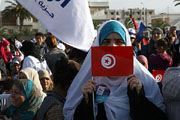-
(单词翻译:双击或拖选)
Tunisian Citizens Ready to Vote
Ten months after ousting1 longtime dictator Zine el-Abidine Ben Ali, Tunisians vote Sunday in their first democratic elections since independence. Tunisia's January revolution sparked the revolts now spreading across the Arab world. Much is at stake, and the elections are being closely watched, because they could emerge as possible model for the region.
After decades of one-party rule, Tunisians now have plenty of choice. Thousands of candidates are running in Sunday's elections to select a so-called Constituent2 Assembly. The assembly is tasked to draw up a new constitution and chart a political roadmap for this North African country.
Political science professor Steven Ekovich of the American University of Paris has followed Tunisian politics for years. He says the vote is being closely watched, especially in Egypt and other parts of the Arab world.
"The Arab Spring started in Tunisia and if it's going to have any success, that success will also start in Tunisia," said Ekovich. "We know that if any country can do it, if any country can make a successful transition to democracy it will be Tunisia. And that will have enormous impact if it's successful, for example on Egypt. And Egypt is really the keystone to the Arab world."
 |
| A supporter of the Islamic Ennahda party displays her national flag during a rally in Ben Arous, south of Tunis, October 21, 2011. |
Many Tunisians, like Waisi Adili, 34, are casting their vote for the first time. Adili, who is unemployed3, hopes the elections will usher4 in a political system that will bring human dignity and work.
Polls put Ennahdha as the clear frontrunner. The party that was banned under former dictator Zine el Abidine Ben Ali, is living up to its name, which means "Renaissance," in Arabic. Party spokeswoman Yusra Ghannouchi is the daughter of Ennahdha leader Rachid Ghannouchi. He returned to Tunisia in January, after more than two decades in exile in England. She says her father's party is about politics, not religion.
"We take inspiration from the ethical5 values of Islam which we believe are universal values - freedom, dignity, equality," said Ghannouchi. "Just like other parties might take inspiration from various liberal or leftist backgrounds. So religion is not something we believe the state will interfere6 in or impose, it is a matter of personal choice."
A British-educated doctoral student, the younger Ghannouchi says Ennahdha wants to preserve and develop the considerable rights of Tunisian women, who are considered the most emancipated7 in the Arab world.
"We have detailed8 in our program many policies that would advance women's rights further while stressing their right to education, to employment, to full equality including equal pay including combating all forms of violence against women," added Ghannouchi.
Ennahdha draws widespread support. At its last pre-election rally in the Tunis suburb of Ben Arous, women in headscarves mingled9 with some who were bare headed and wearing jeans.
Tunisia's recent political history has been orientated10 to the West. And many voters are eying a myriad11 of more secular12, leftist parties - like the Modern Democratic Pole (PDM coalition).
Handing out flyers on the main Habib Bourguiba Avenue during the last day of campaigning, PDM candidate, Samir Taieb warns against mixing religion and politics.
Taieb says Ennahdha represents a danger, not only because of its religious bent13, but because it had a hidden agenda. He warns it will roll back women's rights.
Women like university student Beya Ben Assin are also worried. Assin fears that if Ennahdha gains power, it may curtail14 her ability to speak, dress and work as she chooses.
There are 217 seats up for grabs and observers say that Ennahdha is unlikely to capture the majority. It is already in talks to form coalitions15. And what many Tunisians say is most important is that finally their vote will count.
 收听单词发音
收听单词发音
1
ousting

|
|
| 驱逐( oust的现在分词 ); 革职; 罢黜; 剥夺 | |
参考例句: |
|
|
|
2
constituent

|
|
| n.选民;成分,组分;adj.组成的,构成的 | |
参考例句: |
|
|
|
3
unemployed

|
|
| adj.失业的,没有工作的;未动用的,闲置的 | |
参考例句: |
|
|
|
4
usher

|
|
| n.带位员,招待员;vt.引导,护送;vi.做招待,担任引座员 | |
参考例句: |
|
|
|
5
ethical

|
|
| adj.伦理的,道德的,合乎道德的 | |
参考例句: |
|
|
|
6
interfere

|
|
| v.(in)干涉,干预;(with)妨碍,打扰 | |
参考例句: |
|
|
|
7
emancipated

|
|
| adj.被解放的,不受约束的v.解放某人(尤指摆脱政治、法律或社会的束缚)( emancipate的过去式和过去分词 ) | |
参考例句: |
|
|
|
8
detailed

|
|
| adj.详细的,详尽的,极注意细节的,完全的 | |
参考例句: |
|
|
|
9
mingled

|
|
| 混合,混入( mingle的过去式和过去分词 ); 混进,与…交往[联系] | |
参考例句: |
|
|
|
10
orientated

|
|
| v.朝向( orientate的过去式和过去分词 );面向;确定方向;使适应 | |
参考例句: |
|
|
|
11
myriad

|
|
| adj.无数的;n.无数,极大数量 | |
参考例句: |
|
|
|
12
secular

|
|
| n.牧师,凡人;adj.世俗的,现世的,不朽的 | |
参考例句: |
|
|
|
13
bent

|
|
| n.爱好,癖好;adj.弯的;决心的,一心的 | |
参考例句: |
|
|
|
14
curtail

|
|
| vt.截短,缩短;削减 | |
参考例句: |
|
|
|
15
coalitions

|
|
| 结合体,同盟( coalition的名词复数 ); (两党或多党)联合政府 | |
参考例句: |
|
|
|















